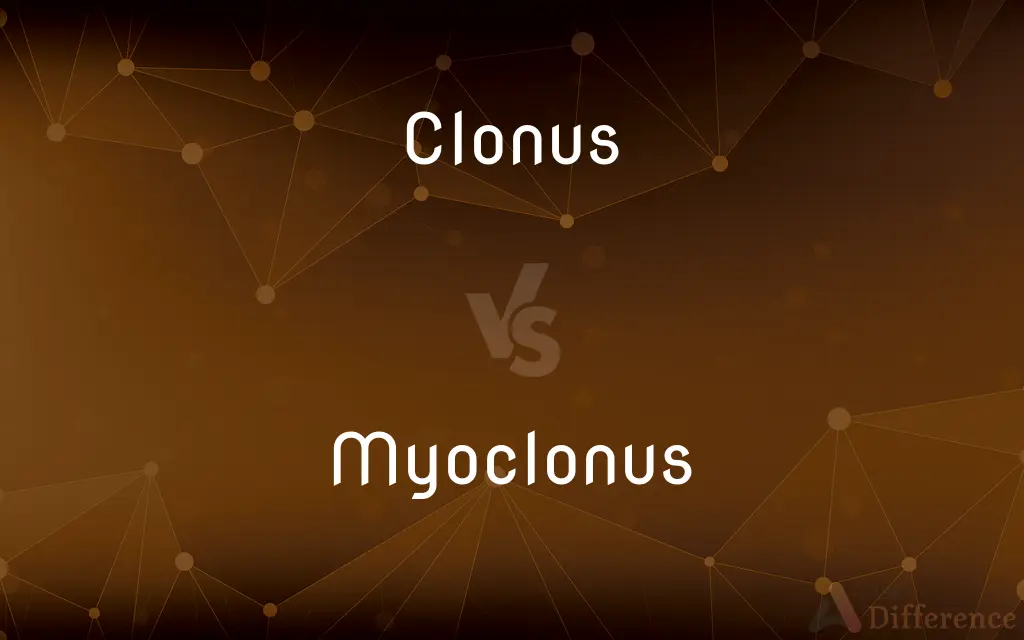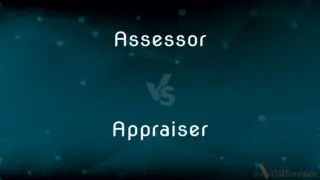Clonus vs. Myoclonus — What's the Difference?
Edited by Tayyaba Rehman — By Fiza Rafique — Updated on March 19, 2024
Clonus involves rhythmic muscle contractions, often signifying neurological conditions, while myoclonus features sudden, brief muscle jerks, linked to both normal and abnormal processes.

Difference Between Clonus and Myoclonus
Table of Contents
ADVERTISEMENT
Key Differences
Clonus is a neurological condition characterized by involuntary and rhythmic muscle contractions that typically indicate an underlying health issue, often related to a lesion in the nerve pathway. These contractions can be sustained or repetitive and are usually provoked by a sudden muscle stretch. Whereas myoclonus consists of sudden, brief, involuntary muscle jerks or twitches, which can be symptomatic of various neurological disorders but may also occur in healthy individuals without any pathological significance.
While clonus is often associated with conditions such as multiple sclerosis, stroke, or spinal cord injury and can be seen in certain areas of the body like the ankles or knees, myoclonus may be observed as a result of sleep, as in hypnic jerks, or in association with a wider range of conditions including epilepsy, Alzheimer’s disease, or even as a reaction to medication. This distinction highlights the differing clinical contexts and potential underlying causes of each condition.
The rhythmic nature of clonus distinguishes it from the sporadic and unpredictable jerks of myoclonus. This rhythmic pattern in clonus can sometimes help in diagnosing the severity and the type of underlying neurological damage, while the varied presentation of myoclonus requires a broad diagnostic approach to determine its cause and significance.
The management and treatment of clonus often involve addressing the underlying cause, if identifiable, and may include physical therapy, medications, or other interventions aimed at reducing muscle tension and improving motor control. On the other hand, the treatment of myoclonus focuses on the specific type of myoclonic jerks present and may involve medications such as anticonvulsants, if the jerks are epileptic in nature, or other treatments tailored to the underlying cause.
In terms of prognosis, clonus often reflects the presence of a significant neurological disorder, and its management largely depends on the ability to treat the underlying condition. Myoclonus, however, can vary widely in its implications, from benign phenomena requiring no treatment to symptoms of serious neurological diseases that may need comprehensive management strategies.
ADVERTISEMENT
Comparison Chart
Definition
Involuntary, rhythmic muscle contractions indicating neurological conditions.
Sudden, brief involuntary muscle jerks, can be normal or indicate neurological issues.
Causes
Often associated with nerve pathway lesions due to stroke, MS, or spinal cord injury.
Can be physiological (e.g., hypnic jerks) or due to epilepsy, Alzheimer's, or medication.
Nature
Rhythmic and can be provoked by muscle stretch.
Sudden and unpredictable jerks.
Associated Areas
Commonly seen in ankles and knees.
Can occur in any muscle group.
Treatment Focus
Addressing underlying cause, reducing muscle tension, improving motor control.
Tailored to the type, possibly involving anticonvulsants for epileptic jerks.
Compare with Definitions
Clonus
Neurological Indicator.
Observing clonus in a patient can be a key indicator of neurological damage, especially in the central nervous system.
Myoclonus
Sudden Muscle Jerks.
Myoclonus can cause a person's arm to jerk suddenly without any control.
Clonus
Involuntary Muscle Contractions.
Clonus often manifests as repetitive, rhythmic shaking of the foot when the foot is rapidly moved upward.
Myoclonus
Wide Range of Causes.
Myoclonus may appear as a reaction to medication, making it essential to review a patient's drug history.
Clonus
Provoked by Muscle Stretch.
Stretching the muscle suddenly can trigger clonus, evident in clinical examinations.
Myoclonus
Variable in Presentation.
Myoclonic jerks can vary greatly in frequency and intensity, from mild to severe.
Clonus
Associated with Specific Conditions.
Patients with multiple sclerosis may experience clonus as a symptom of their condition.
Myoclonus
Treatment Specific.
For epileptic myoclonus, treatments may include antiepileptic drugs to manage the jerks.
Clonus
Treatment Oriented.
Treatment plans for clonus may include medications like baclofen to reduce muscle excitability.
Myoclonus
Physiological Phenomena.
A common form of myoclonus is the hypnic jerk experienced by people while falling asleep.
Clonus
Clonus is a set of involuntary and rhythmic muscular contractions and relaxations. Clonus is a sign of certain neurological conditions, particularly associated with upper motor neuron lesions involving descending motor pathways, and in many cases is, accompanied by spasticity (another form of hyperexcitability).
Myoclonus
Myoclonus is a brief, involuntary, irregular (lacking rhythm) twitching (different from clonus, which is rhythmic/ regular) of a muscle or a group of muscles. It describes a medical sign and, generally, is not a diagnosis of a disease.
Clonus
An abnormality in neuromuscular activity characterized by rapidly alternating muscular contraction and relaxation.
Myoclonus
A sudden irregular twitching of muscles or parts of muscles, occurring in various brain disorders.
Clonus
(medicine) A muscular spasm with regular contractions.
Myoclonus
(medicine) The brief, involuntary twitching of a muscle or group of muscles.
Clonus
A series of muscular contractions due to sudden stretching of the muscle, - a sign of certain neuropathies.
Myoclonus
A clonic spasm of a muscle or muscle group
Clonus
Convulsion characterized by alternating contractions and relaxations
Common Curiosities
Can clonus be a sign of a serious condition?
Yes, it often indicates the presence of serious neurological disorders.
What is myoclonus?
Myoclonus consists of sudden, brief involuntary muscle jerks, which can occur in healthy individuals or as a symptom of neurological disorders.
What causes clonus?
It's often caused by nerve pathway lesions from conditions like stroke, multiple sclerosis, or spinal cord injuries.
Are clonus and myoclonus the same?
No, they differ in causes, nature, and treatment approaches. Clonus is rhythmic, while myoclonus is characterized by sudden jerks.
How is myoclonus treated?
Treatment varies based on the type and cause, including anticonvulsants for epileptic myoclonus.
What is clonus?
Clonus is a condition characterized by involuntary and rhythmic muscle contractions, usually indicative of neurological issues.
How is clonus treated?
Treatment focuses on the underlying cause, and may include physical therapy and medications to reduce muscle tension.
What causes myoclonus?
Causes range from physiological processes, like hypnic jerks, to neurological conditions, such as epilepsy or reaction to medication.
Can clonus and myoclonus coexist?
Yes, individuals with certain neurological conditions may experience both symptoms.
What distinguishes clonus from myoclonus?
Clonus is characterized by rhythmic contractions and often indicates neurological conditions, whereas myoclonus involves sudden jerks that can be either normal or indicate a problem.
Can healthy people experience myoclonus?
Yes, healthy individuals can experience myoclonus, such as hypnic jerks.
How are clonus and myoclonus diagnosed?
Diagnosis involves clinical evaluation, medical history, and sometimes neurophysiological testing.
Is there a cure for clonus or myoclonus?
Treatment focuses on managing symptoms and underlying conditions; there's no one-size-fits-all cure.
Can lifestyle changes help manage myoclonus or clonus?
While specific treatments are necessary, lifestyle changes can support overall health and may reduce symptoms.
Is myoclonus always a sign of disease?
No, it can be a normal phenomenon or related to various diseases, depending on the context and type.
Share Your Discovery

Previous Comparison
Consecration vs. Ordination
Next Comparison
Assessor vs. AppraiserAuthor Spotlight
Written by
Fiza RafiqueFiza Rafique is a skilled content writer at AskDifference.com, where she meticulously refines and enhances written pieces. Drawing from her vast editorial expertise, Fiza ensures clarity, accuracy, and precision in every article. Passionate about language, she continually seeks to elevate the quality of content for readers worldwide.
Edited by
Tayyaba RehmanTayyaba Rehman is a distinguished writer, currently serving as a primary contributor to askdifference.com. As a researcher in semantics and etymology, Tayyaba's passion for the complexity of languages and their distinctions has found a perfect home on the platform. Tayyaba delves into the intricacies of language, distinguishing between commonly confused words and phrases, thereby providing clarity for readers worldwide.
















































